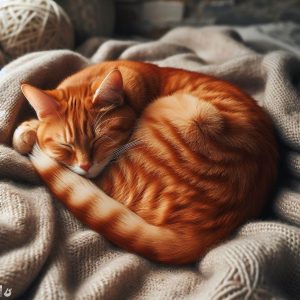You come home and notice your usually energetic cat lounging around more than normal. Upon closer inspection, you realize your cat is breathing rapidly and purring at the same time. As a caring cat owner, this is likely concerning and you probably wonder – why is my cat breathing fast and purring?
While heavy, rapid breathing and purring together can signify an issue, it doesn’t necessarily mean an emergency. By understanding the potential reasons behind this behavior, you’ll be better able to assess whether your cat needs immediate veterinary care. This article covers the most common reasons for rapid breathing and purring in cats, along with tips on how to respond appropriately.
Reasons For Rapid Breathing And Purring
Let’s overview the most common explanations vets see for simultaneous rapid breathing and purring in cats:
1. Pain Or Discomfort
One of the top reasons for this behavior is that kitty is experiencing some form of physical pain or discomfort in their body.
Purring creates vibrations that are thought to release endorphins – the body’s natural pain relievers. So cats often purr as a self-soothing response to pain.
The purring paired with rapid breathing reflects your cat’s attempt to alleviate discomfort and circulate more oxygen while doing so.
Potential sources of pain leading to this response include:
- Dental disease – Broken teeth, abscesses, and other mouth pain
- Arthritis – Joint pain and stiffness, especially in older cats
- Bladder or urinary tract infections – Burning and inflammation during urination
- Digestive issues – Nausea, vomiting, diarrhea causing stomach upset
- Recent injuries or trauma – Soreness and inflammation from wounds, falls, bites, etc.
So if your cat is exhibiting rapid breathing and purring, conduct a tip-to-toe physical exam looking for signs of injury, swelling, sensitivity, or reactions to palpation. Focus extra attention on the mouth, belly, legs and joints, urinary opening, and rectum.
Schedule a veterinary visit promptly to pinpoint and treat the source of discomfort. The vet will palpate for pain and may recommend blood tests, x-rays, or other imaging to diagnose the issue. Fast breathing related to pain often resolves once treatment successfully eases the discomfort.
2. Stress Or Anxiety
Rapid breathing coupled with purring can also result from psychological stress or anxiety in cats, rather than physical causes.
Purring is a key self-soothing mechanism cats use to comfort themselves when scared or overly excited. The heavy breathing matches kitty’s stimulated state.
Scenarios that can elicit this anxious response include:
- Dramatic environmental changes – New home, construction noise, rearranged furniture
- Introduction of new pets or family members
- Presence of unfamiliar guests or children stressing out kitty
- Loud noises like thunder, fireworks, or vacuums
- Traveling in cars, planes, or carriers to unfamiliar locations
If stress seems the likely cause, focus on minimizing anxiety-provoking situations to soothe your cat’s nerves. Make sure they have access to quiet, safe hiding spots. Increase play, exercise, and affection. Consider calming supplements or pheromone diffusers.
Breathing and purring related to stress often gradually resolve as kitty adjusts and their anxiety decreases. But persistent or worsening anxiety warrants a veterinary visit to address the root cause and rule out other conditions.
3. Overheating
Due to their dense coats of fur, cats are prone to overheating, especially in warm weather.
Hard purring creates vibrations that circulate air over the cat’s body to cool themselves down. The rapid breathing brings in extra oxygen while also reducing body temperature.
Watch for this in response to:
- Hot ambient temperatures exceeding 78°F
- Bouts of prolonged exercise or play
- Being trapped in confined, stuffy spaces like closets
- Fevers from infections making kitty’s body overly hot
If you suspect overheating, move your cat to a cooler area right away. Brush out thick fur. Offer cool – not cold – water to prevent panting and dehydration. You can also dampen kitty’s coat and paws with cool water.
Monitor their temperature – normal is 100-102°F. If it persists above 104°F or they seem profoundly distressed, get emergency vet assistance. Prompt cooling and rehydrating overheated cats prevents lasting organ damage.
4. Heart Problems
In more serious cases, cats may breathe rapidly and purr due to underlying heart conditions impacting how efficiently the heart can pump blood and oxygen throughout the body.
Some examples of heart problems that can cause fast breathing include:
- Hypertrophic cardiomyopathy – Thickened heart muscle forcing the heart to work harder to pump blood
- Heart murmurs – Abnormal turbulent blood flow between heart chambers
- Heartworm disease – Parasitic infection obstructing blood flow
- Pericardial effusion – Fluid accumulation around the heart
Cats exhibiting rapid breathing and purring due to suspected heart issues should be evaluated by a vet immediately. The vet will listen closely to the cat’s heart and likely order further testing like:
- Bloodwork to assess heart enzyme levels
- Chest x-rays to examine heart size and shape
- Echocardiograms to visualize heart function and structure
Once the underlying heart condition is diagnosed, prognosis and treatment focus on resolving that specific issue based on veterinary guidance. Never try to self-treat suspected heart problems at home.
5. Respiratory Infections
Upper respiratory infections that cause congestion, swelling, and irritated airways can also prompt faster breathing and purring as cats try to clear their breathing passages.
Infections from viruses, bacteria, or fungi are often the culprits. Common symptoms pointing to respiratory infection include:
- Runny or crusty nose and eyes
- Sneezing and nasal discharge
- Coughing
- Loss of appetite
- Lethargy
Veterinarians can run tests on nasal swabs and bloodwork to pinpoint the type of infection at hand. Treatment usually includes:
- Antibiotics for bacterial infections
- Antivirals for viral infections
- Antihistamines and decongestants to reduce nasal swelling and drainage
Supportive care like fluids and appetite stimulants also help overcome respiratory infections. Limit stress and keep your cat resting in the meantime. Bouts of rapid breathing and purring should improve as the infection clears.
Warning Signs Needing Urgent Veterinary Care
While rapid breathing coupled with purring does not necessarily constitute an emergency, you should seek urgent veterinary care if:
- Breathing seems severely labored with open-mouth panting or wheezing sounds
- Gums or tongue appear blue/grey in color from lack of oxygen
- Fast breathing persists over several hours without improvement
- Cat becomes extremely weak, lethargic, or collapses/faints
- Sudden onset of respiratory distress after seeming normal
Also get to an emergency vet promptly if fast breathing is paired with any of the following:
- Coughing up blood
- Chest pain when palpated
- Exercise intolerance or sudden lethargy
- Hiding and avoiding contact
- Crying out when touched or moved
- Appetite loss and dehydration
These accompanying warning signs indicate potentially critical conditions requiring urgent medical care, which may include:
- Pneumonia
- Pulmonary embolism
- Trauma to the chest
- Heart failure
- Toxins
- Blood clots
- Pyothorax
Do not delay seeking veterinary assessment if your cat is exhibiting any non-normal breathing behaviors plus concerning secondary symptoms. Timely treatment is crucial for the best outcome, especially with breathing issues.
Tips For Responding To Rapid Breathing And Purring
If your cat is breathing rapidly along with purring, here are some tips while assessing whether veterinary care is needed:
- Remain calm – Cats sense our anxiety which can worsen their own stress.
- Eliminate stressors – Remove loud noises, people, pets, etc creating anxiety.
- Provide safe hiding spots – Give kitty a quiet, dark, confined place to retreat to.
- Check for injuries – Look for wounds, swelling, sensitivity needing treatment.
- Monitor temperature – High fevers can cause breathing issues.
- Brush coat – Removing excess fur can cool an overheated cat.
- Offer water – Dehydration exacerbates respiratory signs like panting.
- Assess gums – Blue/grey color indicates poor oxygenation.
- Time symptoms – Call the vet if fast breathing lasts over 1-2 hours.
- Listen to breathing – Note any abnormal sounds like wheezing.
- Monitor eating/drinking – Appetite loss accompanies serious illness.
- Limit stress – Keep handling and activity to a minimum.
- Follow veterinary advice – They’ll guide you on next steps like diagnostic tests.
With attentive observation and prompt medical intervention when appropriate, episodes of rapid breathing and purring in cats often resolve with treatment. Try to stay calm yourself, as cats feel our stress. Know the potential causes, warning signs, and emergency tips so you can make informed decisions about your cat’s health. Monitor closely and never hesitate to call your vet with any concerns about changes in your cat’s breathing.
Frequently Asked Questions
Below are answers to some common questions cat owners have about rapid breathing and purring:
Should I be worried if my cat is purring while breathing fast?
Mild to moderate rapid breathing coupled with purring is not necessarily an emergency, but does warrant attentive monitoring and following your vet’s guidance. However, seek emergency care if breathing seems profoundly abnormal or labored, or if other concerning symptoms develop.
What is considered fast breathing in cats?
The normal feline respiratory rate is 15-40 breaths per minute when resting. Fast breathing is usually defined as exceeding 40 breaths per minute persistently. Panting over 160 breaths per minute signals extreme respiratory distress requiring urgent veterinary care.
How can I tell if my cat’s breathing is abnormal?
Key indicators of abnormal breathing in cats include:
- Respiratory rate higher than 40 breaths per minute
- Exaggerated abdominal effort with breathing
- Open mouth breathing or panting
- Breathing with an extended neck or head
- Wheezing, gasping, or making other noises
- Flared nostrils
- Inability to relax and symptoms persisting over hours
Is it normal for cats to purr when breathing fast?
It’s not necessarily abnormal for purring to happen simultaneously with rapid breathing. The self-comforting properties of purring may ease any discomfort also causing the heavy breathing. However, any sustained changes in your cat’s regular pattern of breathing warrant medical investigation.
What does a cat’s purr signify?
A cat’s purr serves many beneficial functions, including:
- Easing pain and promoting healing
- Signaling contentment and calmness
- Soothing fear, anxiety or distress
- Strengthening social bonds between cats and owners
- Regulating breathing rate and heart rate
So view purring as your cat’s way of self-soothing and communicating their emotional state.
Summary
Increased respiratory rate coupled with purring in cats can result from many causes ranging from stress to overheating to potentially serious medical conditions. Evaluate any breathing changes in context – a short-lived episode after exercise may just indicate overexertion, while persistent or worsening symptoms likely signify illness requiring prompt veterinary diagnosis and care.
Monitor cats with rapid breathing and purring closely, minimize anxiety, follow your vet’s advice, and don’t hesitate to seek emergency care when recommended. Understanding why your cat is exhibiting this behavior will help you respond appropriately to safeguard their health and happiness.



